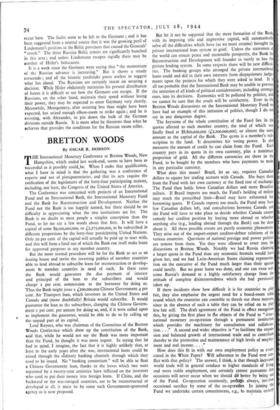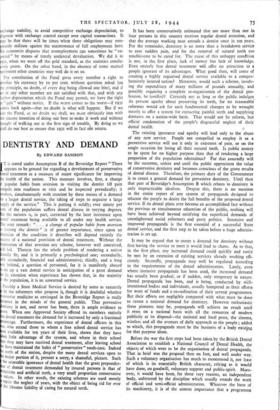BRETTON WOODS
By OSCAR R. HOBSON
THE International Monetary Conference at Bretton Woods, New Hampshire, which ended last week-end, seems to have been as successful as it possibly could.be. When I make that qualification, what I have in mind is that the gathering was a conference of experts and not of plenipotentiaries, and that its acts require the ratification of the legislatures of the forty-four participating nations, -including, not least, the Congress of the United States of America.
The Conference was concerned with projects of an International Fund and an International Bank, the International Monetary Fund and the Bank for Reconstruction and Development. Neither the Fund nor the Bank is too happily named, but there shduld be no difficulty in appreciating what the two institutions are for. The Bank is no doubt to most people a simpler conception than the Fund, so let me say a few words about that first. It will have a capital of some $9,too,000,000, or L2,275,000,000, to be subscribed in different proportions by the forty-four participating United Nations. Only 20 per cent. of the capital will actually be paid up to start with, and this will form a fund out of which the Bank can itself make loans for approved purposes to any member country.
But the more normal procedure will be for the Bank to act as an issuing house and invite the investing publics of member countries able to lend abroad to subscribe loans for reconstruction or develop- ment ro member countries in need of such. In these cases the Bank would guarantee the due payment of interest and principal of the loan to the subscribers and would charge z per cent. commission to the borrower for doing so. Thus the Bank might issue a kzoo,000,000 Chinese Government 4 per cent. Air Transport loan, which investors in the United States and Canada and (more doubtfully) Britain would subscribe. It would guarantee the loan to the subscribers, charging the Chinese Govern- ment t per cent. per annum for doing so, and, if it were called upon to implement the guarantee, would be able to do so by calling up the unpaid part of its capital.
Lord Keynes, who was chairman of the Committee of the Bretton Woods Conference which drew up the constitution of the Bank, said that, while he would not say the Bank was more important than the Fund, he thought it was more urgent. In saying that he had in wind, I imagine, the fact that it is highly unlikely that, at least in the early years after the war, international loans could be raised through the ordinary banking channels through which they used to be issued. No " banking consortium " will be able to float a Chinese Government loan, thanks to the losses which two wars separated by a twenty-year armistice have inflicted on the investors who used to put their money into foreign loans. If China, and the backward or the war-ravaged countries, are to be reconstructed or developed at all, it must be by some such Government-sponsored agency as is now proposed.
But let it not be supposed that the mere formation of the Bank, with its imposing title and impressive capital, will automatically
solve all the difficulties which have (as we must assume) brought the
private international loan system to grief. Unless the statesmen of the world can ensure peace and reasonable prosperity, the Bank for Reconstruction and Development will founder as surely as has the private lending system. In some respects there will be new difficul- ties. The banking groups who arranged the private international loans could and did in their own interests form dispaisionate judge.
ments upon the projects for which they were asked to lend. It is all too probable that the International Bank may be unable to prevent the intrusion of all kinds of political considerations, including strategic ones, into its decisions. Economics will be polluted by politics, and we cannot be sure that the result will be satisfactory. Even in the
Bretton Woods discussions on the International Monetary Fund we have had an example of this intrusion of politics, though I do not say in any dangerous degree.
The keystone of the whole constitution of the Fund lies in the quotas allotted to each member country, the total of which was
finally fixed at $8,800,000,000 (L2,2oo,000,000), or almost the same
amount as the capital of the Bank. The quota is a member's sub- scription to the fund. It determines his voting power. It also measures the amount of credit he can claim from the Fund. Each country pays in its quota in its own currency, plus a minimum proportion of gold. All the different currencies are there in the Fund, to be bought by the members who have payments to make in any particular currency.
What does this mean? Brazil, let us say, requires Canadian dollars to square her trading account with Canada. She buys them from the Fund with her own currency at the fixed rate of exchange. The Fund then holds fewer Canadian dollars and more Brazilian milreis. If Brazil imports too much, the Fund's holding of milreis may reach the prescribed limit—Brazil may have exhausted her borrowing quota. If Canada exports too much, the Fund may have few Canadian dollars left, and consultations between Canada and the Fund will have to take place to decide whether Canada cannot remedy her creditor position by buying more abroad or whether anything else (e.g., lending abroad through the Bank) can be done about it. All these possible events are purely economic phenomena They arise out of the import-export creditor-debtor relations of the various countries. Questions of national prestige and power politics are remote from them. Yet they were allowed to enter into the discussions at Bretton Woods. Notably we had Russia claiming a larger quota in the Fund than any economic formula would have given her, and we had Latin-American States claiming representa- tion on the executive of the Fund much larger than their quotas could justify. But no great harm was done, and one can even wel- come Russia's demand as a highly satisfactory change from the attitude of complete disinterestedness which she had previously
taken up. •
If these incidents show how difficult it is for countries to play fair, they also emphasise the urgent need for a board-room table round which the countries can assemble to thresh out these matters, since in the absence of such a table they can be relied on to 04 less fair still. The draft agreement of the Fund in effect recognises this, by giving the first place in the objects of the Fund to " inter- national monetary co-operation through a permanent institution which provides the machinery for consultation and collabora- tion.. .." A second and wider objective is " to facilitate the expan- sion and balanced growth of international trade and to contribute thereby to the promotion and maintenance of high levels of anpinY' ment and real income. . . ."
How does this fit in with our own employment policy as enun- ciated in the White Paper? Will adherence to the Fund ever con' flict with that policy? The answer, I think, is that though increased world trade will in general conduce to higher standards of living and more stable employment, one certainly cannot guarantee that occasions will never occur when we should clei better by being not of the Fund. Co-operation commonly, pers always, involves occasional sacrifice by some of the co-operators. In joining the Fund we undertake certain commitments, e.g., to maintain orderli
:xchange stability, to avoid competitive exchange depreciation, to iispense with exchange control except over capital transactions. It nay be that there will be times when these obligations may tern- aorarily militate against the maintenance of full employment here. '[:[ economist disputes that unemployment can sometimes be " ex- sorted " by means of timely unilateral devaluation. We did it in [931, when we went off the gold standard, as the statistics conclu- I;vely prove. On the other hand, in the absence of some mutual tgreement other countries may well do it on us,
The constitution of the Fund gives every member a right to devalue his currency by to per cent. without question asked (on he principle, no doubt, of every dog being allowed one bite), and if ,e or any other member are not satisfied with that, and with any urther depreciation which the Fund may permit, we have the right o "quit " without notice. If the worst comes to the worst—if 1931 omes back again—that no doubt is what will happen. But if we n the Fund, as no doubt wr shall, we most obviously join with he sincere intention of doing our best to make it work and without ought of walking out at the first sign of trouble. By doing so we hall do our best to ensure that 1931 will in fact not return.



























 Previous page
Previous page